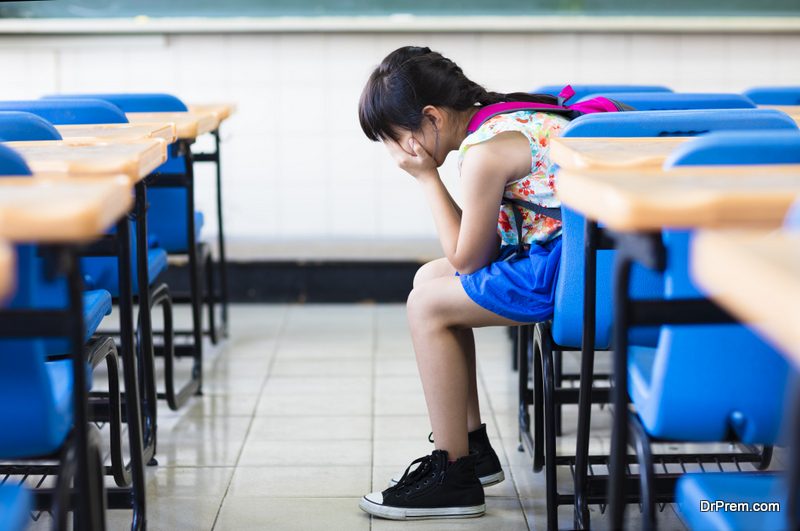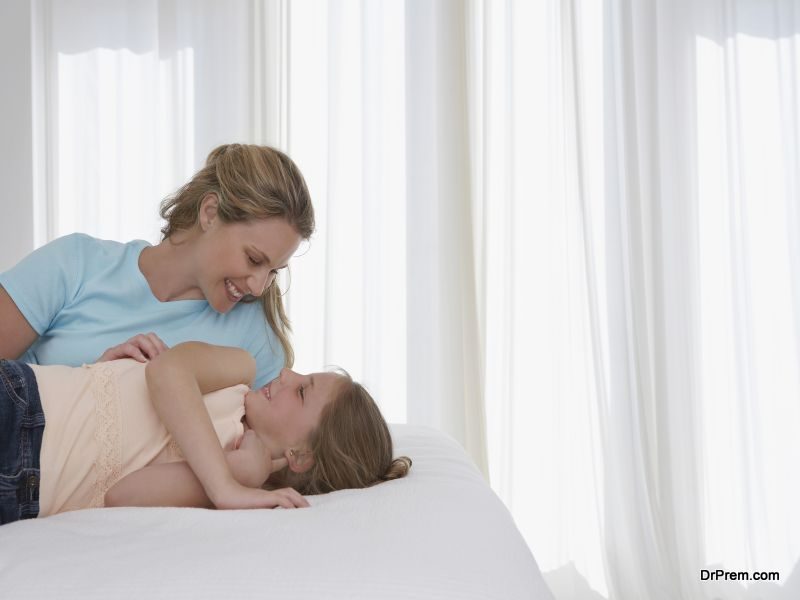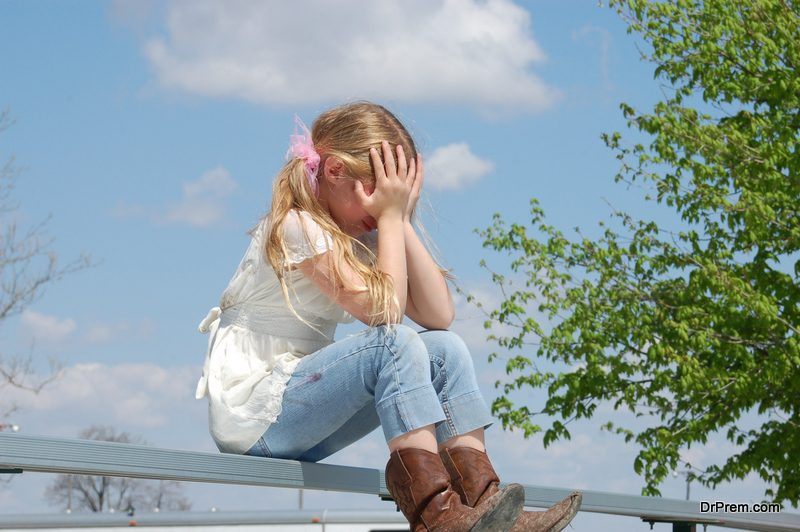To very young children, embarrassment is a new emotion, which they experience when they start going to regular school, from 5-6 years old. They may not know that they are embarrassed and may project it as anger or feeling sad when other children make fun of them. Sometimes children may do something which makes them embarrassed and it is quite difficult for parents to handle it in a positive manner. Here are ways to help your child deal with embarrassment:
Ways to help your child deal with embarrassment
Empathy and compassion
 It could be a simple thing as falling down in the playground or singing the wrong note, but it made your child feel embarrassed. Do not be saddened as embarrassment is a part of socialization. You may be struggling to console your child, but the best and the first thing you should do is being compassionate and empathizing with their feelings.
It could be a simple thing as falling down in the playground or singing the wrong note, but it made your child feel embarrassed. Do not be saddened as embarrassment is a part of socialization. You may be struggling to console your child, but the best and the first thing you should do is being compassionate and empathizing with their feelings.
Do not downplay it, or dismiss it as ‘nothing’. Neither should you overreact or freak out! Listen to them patiently and let them describe their feelings. You could say “Oh it does sound hard!”, or something along those lines! One of the best ways to help your child deal with embarrassment, is to just give them a hug, and hug them for as long as they want to hold on to you! Once they feel comforted, you can move on to the other steps on the process to helping children to manage feelings.
Ask them what they feel
To help them get past embarrassing situation, ask them gently about their experience, why they felt so embarrassed. This will console them as well as make them feel that you are genuinely interested in resolving their problem. When they answer your questions, you will be able to help them better.
Put the embarrassing situation in perspective
 When you look back to your childhood, you will also remember certain incidents which you thought was the worst thing that could happen to you. And over time, these incidents were no longer able to hurt you, but probably you laugh thinking about them now! Use your experience to put your child’s embarrassment in perspective. Do not belittle it, but explain how they will feel better in time, and they too will be able to put it behind them! Explain to them that every single person on earth experiences embarrassment some time or the other, and not dwelling on it will help helping children to manage feelings much better. They need to know that the embarrassing situation is definitely not the end of the world! This is one of the best ways how to help your child deal with embarrassment.
When you look back to your childhood, you will also remember certain incidents which you thought was the worst thing that could happen to you. And over time, these incidents were no longer able to hurt you, but probably you laugh thinking about them now! Use your experience to put your child’s embarrassment in perspective. Do not belittle it, but explain how they will feel better in time, and they too will be able to put it behind them! Explain to them that every single person on earth experiences embarrassment some time or the other, and not dwelling on it will help helping children to manage feelings much better. They need to know that the embarrassing situation is definitely not the end of the world! This is one of the best ways how to help your child deal with embarrassment.
Share your own experience
To help them in overcoming shame cycle, share your own embarrassing story, which could be one from your childhood or a recent one! Tell them that even you thought it was something big at that time, but it was actually nothing, and how it helped you learn how to deal with similar situations. They will feel that they are not alone and will feel much better.
Work on a solution
 Usually, embarrassing situations occur rarely. But if your child is a target of some other child or children who shame him/her on a regular basis, you have to work out something for overcoming shame cycle. Talk to the teacher and let him/her know what has been happening. Talk to the child who is targeting your child to stop the behavior. Or teach your child to ignore that particular child/children.
Usually, embarrassing situations occur rarely. But if your child is a target of some other child or children who shame him/her on a regular basis, you have to work out something for overcoming shame cycle. Talk to the teacher and let him/her know what has been happening. Talk to the child who is targeting your child to stop the behavior. Or teach your child to ignore that particular child/children.
One of the best tips on how to help your child deal with embarrassment, is to teach them that whatever others say about them is absolutely untrue – or, just because someone says something bad to shame him/her, it is just not true! You have to find a way to make your child feel confident and help them get past embarrassing situation.
Teach by example
Children are extremely observant and they soak up everything that we say or do. You wouldn’t even know it but they observe and listen to everything you say or do. So if you’re caught in an embarrassing situation when your child is present, you have to be very careful how you react.
Do not ever obsess or dwell on your embarrassing gaffes and mistakes, and voice them in front of the children, as they will learn to do the same. At least, SHOW that you have moved on, for the sake of the children! You will anyway in time be fine, but do not lose your cool or be upset or they might become insecure and lose confidence. Teaching by example is one of the best ways to help your child deal with embarrassment.
Absolutely no teasing
 Kids do say the funniest things, unknowingly, but never mock them or tease them about it. They will feel humiliated and ashamed, and might even stop speaking in front of strangers. Most kids are single children these days, and do not face any banter from siblings. It’s difficult for them to know what ‘teasing’ is. So if you tease them, they will be very confused and upset!
Kids do say the funniest things, unknowingly, but never mock them or tease them about it. They will feel humiliated and ashamed, and might even stop speaking in front of strangers. Most kids are single children these days, and do not face any banter from siblings. It’s difficult for them to know what ‘teasing’ is. So if you tease them, they will be very confused and upset!
Do not be the cause of embarrassment
Many parents are very anxious to correct their children’s behavior, for their own good, of course! And you should correct your child, but do it in the privacy of your home. Pointing out any mistake in etiquette or any other mistake, for that matter will make him/her feel embarrassed. It is tough not to ‘autocorrect’, but resist that urge and help your child to carry on normally, without noticing or seeming to notice the mistake in front of people.
Teach children not to feel ashamed of normal body functions
 Children are often mortified when they pass gas or burp in the presence of others. There is a very simple way to help your child deal with embarrassment like this – just teach them that saying ‘excuse me’ is enough, and that these are body functions which everyone has. They should think no more about it!
Children are often mortified when they pass gas or burp in the presence of others. There is a very simple way to help your child deal with embarrassment like this – just teach them that saying ‘excuse me’ is enough, and that these are body functions which everyone has. They should think no more about it!
Teaching children and showing them by example to laugh at embarrassing situations is one of the best ways you can help your child. This will create a healthy emotional habit, that of having the ability to laugh at oneself. According to child psychologists, being able to see things in a lighter vein and the ability to laugh at themselves will help them cope with many complicated situations later on in life.




